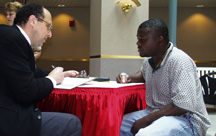When it comes to preventing health problems, Jim O’Donnell, UNMC Information Technology Services, may be the ideal patient. He was relieved recently to find out his blood pressure was within normal range.
 |
Ramesh Adayalampet, M.D., UNMC Department of Neurological Sciences, talks with Jim O’Donnell, UNMC Information Technology Services, about his stroke screening findings. O’Donnell found during the screening he was not at any particular risk for stoke. |
“I’m conscious about getting older and trying to prevent something before it happens,” said O’Donnell. “It’s a shame people who don’t take a more active approach with their health. They usually wait until it’s too late.”
He was part of a steady stream of people who took advantage of a free stroke screening event Friday at UNMC/NHS. The event was held in recognition of National Stroke Awareness Month. About 100 members of the public, as well as employees, filled out questionnaires, had their blood pressure taken and spoke to a health professional about their stroke risk. Educational materials also were available.
The number of people found with undiagnosed or untreated high blood pressure was alarming to health professionals. One person under the age of 45 was referred to the emergency room with symptoms of dizziness, temporary loss of vision and numbness. His diastolic blood pressure was more than 90.
“With what we found, we wouldn’t have let him go anywhere,” said Sandra Roberts, nurse and epilepsy case manager.
Health risks of high blood pressure include stroke, heart attack, retina damage, kidney disease, heart failure and arteriosclerosis.
Of the 100 people who attended the event, 78 had their blood pressure checked. According to Vici Sortino, nurse and case manager of the Nebraska Stroke Center, 31 had normal blood pressures (systolic below 120), 25 were found to be pre-hypertensive (systolic between 120-139), 13 had stage one hypertensive (systolic between 140-159) and nine had stage two hypertensive (systolic over 160).
 |
Pierre Sagitteh (right) gets some advice from Pierre Fayad, M.D., Reynolds Centennial Professor and chairman of the UNMC cepartment of neurological sciences, during the free stroke screening event. |
“Some are not seeing a doctor or are seeing a doctor who’s supposed to be monitoring their blood pressure but aren’t. Their blood pressure is high even by the former guidelines.”
He said statistics show if all those with hypertension were treated, the risk for stroke would be reduced by 50 percent. “Many people don’t even know they have high blood pressure,” he said. “It’s sad some patients are not getting the care they deserve.”
High blood pressure (hypertension) affects about 50 million Americans and 1 billion people worldwide, according to a summary report in last week’s Journal of the American Medical Association Express. The new blood pressure classifications by the Seventh Report of the Joint National Committee on Prevention, Detection, Evaluation, and Treatment of High Blood Pressure, will put more people in the high risk category.
The new classification – prehypertension – describes people with blood pressures between 120-139 millimeters of mercury (mm Hg) systolic (the top number in a blood pressure reading) or 80-89 mm Hg diastolic (bottom number). Before the changes, blood pressures under 140/90 were thought acceptable.
The new guidelines highlight four basic strategies: pay attention to blood pressure before it’s high; in people over age 50, systolic pressure is more important than diastolic; two (or more) drugs are better than one for most patients; and build trusting clinician/patient relationships that motivate patients to be healthy.
For more information about the new guidelines, go to:
http://www.americanheart.org/presenter.jhtml?identifier=3011728